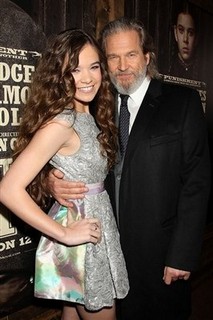Jeff Bridges enters the living room of his hotel suite carrying a dark blue Shambhala paperback by Chögyam Trungpa entitled Training the Mind and Cultivating Loving-kindness. “One reason I’m anxious—because I have some anxiety about this interview, like you do,” he says, as he arranges his long body on the couch, “is that I wish I could be more facile with these things that I find so interesting and care about and want to express to people.” He opens the book. “This will be a challenge for me,” he says. “But I’ll attempt it.”
Bridges is 61. Solidly built, he reminds me of an Andalusian carriage horse in late prime, trustworthy and sensitive. He is wearing jeans, clogs, a chambray shirt, and the Rolex Submariner watch that his late father, Lloyd Bridges, wore on the television series Sea Hunt. Were it not for his lightly mussed hair and that expensive watch, he could be a motorcycle mechanic.
We’re talking in Austin, Texas, where he’s filming a violent, darkly comic version of the Western True Grit—the first “period Oater” (as Variety put it) to be directed by the filmmakers Ethan and Joel Coen. In it, Bridges plays Rooster Cogburn, an aging U.S. Marshal who has, not surprisingly, a drinking problem. Like the washed-up country singer of Crazy Heart, the self-betraying lounge pianist of The Fabulous Baker Boys, and the reluctant ex-convict father of American Heart, Cogburn is one of a string of beautiful losers Bridges has portrayed teetering on the brink of some sort of redemption. His acting is so naturalistic and seemingly effortless, in fact, that you can forget that it’s acting.
The Big Dreams & Buddhist Bent of Jeff Bridges

Read Full Article »
Comment



